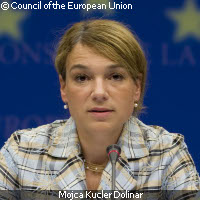Slovenia looks back on a successful presidency
'We were warned that our programme is too ambitious; however, today we are proud to say we have succeeded.' With these words, Slovenia's Minister for Higher Education, Science and Technology, Mojca Kucler Dolinar, summed up her country's achievements in the field of research policy during its presidency of the EU. Minister Dolinar was presenting Slovenia's work to the European Parliament's Committee on Industry, Research and Energy on 26 June. She was particularly proud of the work done by the presidency on the European Research Area (ERA), for example through the launch of the 'Ljubljana Process'. This sets out a vision for the ERA based on four key principles: free movement of knowledge; modern research institutions working together in globally competitive clusters; favourable conditions for all research actors, including the private sector and small and medium-sized enterprises (SMEs); and benefits for citizens from research-based efforts to solve major societal challenges. The Ljubljana Process places a particular emphasis on improving the governance of the ERA and linking it up with other policies such as education, innovation and cohesion. Work on the governance of the ERA should bear in mind a number of principles, including the wide range of actors involved in the ERA, and should be based on a long term partnership between the Member States, the countries associated to the framework programmes, the Commission and other relevant initiatives. Work on this process is set to be taken up by future EU presidencies. The Slovenians also managed to gain agreement on the seat of the new European Institute of Innovation and Technology (EIT). After long negotiations, Member States finally agreed that the EIT should be situated in the Hungarian capital, Budapest. 'I believe that with this decision the ministers have shown we can put short-term considerations aside in exchange for long-term benefits for Europe,' commented Ms Dolinar. Another priority of the Slovenes was EU-Russia cooperation. At the first meeting of the EU-Russia Permanent Partnership Council on Research in May, both parties looked forward to closer EU-Russia research cooperation. The EU delegation promised to look into the possibility of allowing Russia to become officially associated to the Seventh Framework Programme (FP7). Gaining associated status would enable Russian scientists to participate fully in FP7 on an equal footing with EU researchers. Elsewhere during the Slovenian Presidency, ministers gave the green light to a number of important programmes, including the Fuel Cells and Hydrogen (FCH) Joint Technology Initiative (JTI), and the Article 169 initiatives 'Ambient assisted living' (AAL), which will encourage the use of information and communications technologies (ICTs) in improving the quality of life of the elderly, and EUROSTARS, which promotes research performing SMEs. Slovenia has held the EU Presidency since the beginning of the year, the first new Member State to hold the position. France will take over the role on 1 July.
Countries
Slovenia



